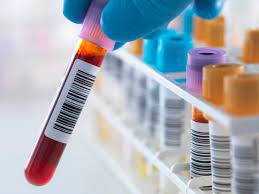Normal haemoglobin (Hb) levels by age and gender

In this article, we will describe normal haemoglobin (Hb) levels, by age and gender.
Normal haemoglobin levels depend on the age and, beginning in adolescence, the gender of the person.
| Newborn | 170 – 220 g/L |
|---|---|
| One (1) week | 150 – 200 |
| One (1) month | 110 – 150 |
| Children | 110 – 130 |
| Adult Men | 130 – 180 |
| Adult Women | 110 – 150 |
| Elderly Men | 125 – 150 |
| Elderly Women | 110 – 140 |
Note. All of these values from a haemoglobin blood test may vary slightly between laboratories.
Some laboratories do not differentiate between adult and elderly haemoglobin values.
What does a low haemoglobin level mean?
A low haemoglobin level is referred to as anaemia. This means there is a lower-than-normal number of red blood cells. There are many reasons (causes) for anaemia.
What are symptoms of low haemoglobin (anaemia)?
In mild anaemia (90-110 g/L in a woman, 100-130 g/L in a man, there are usually no symptoms.
In moderate-severe anaemia (<80 g/L in a woman, <90 g/L in a man), your red blood cells can’t get enough oxygen to the rest of your body – and you may have symptoms such as:
- Fatigue: Even with mild anaemia, you may feel tired and weak. Fatigue is often one of the first symptoms of anaemia.
- Pale skin and gums: A later symptom of anaemia is skin and gums that are paler than usual or yellowish.
- Temperature issues: As anaemia worsens, it can cause increased sweating or cold hands and feet.
- Dizziness: Moderate anaemia can make you feel dizzy (like the room is spinning) or lightheaded (like you might pass out).
- Rapid heart rate: Fewer red blood cells mean your heart has to pump harder than usual to get enough oxygen to all the parts of your body, so your pulse may be faster (which you feel as palpitations). Severe anaemia can even cause an irregular heartbeat.
- Headache: Moderate to severe anaemia can cause headaches. Like most of the symptoms listed here, headaches have other causes and don’t necessarily mean you have anaemia.
- Shortness of breath: Moderate anaemia can make you breathe faster than normal. When anaemia becomes severe, you may feel like you can’t catch your breath or experience chest pain (called angina; often related to exercise).
Summary
We have described normal Hb levels, by age and gender; what anaemia means, and its symptoms. We hope it has been helpful.

